This article highlights the wonderful benefits of ABA Discrete Trial Training (DTT) for children's growth, especially for those with autism. It’s all about how DTT’s structured approach can make a real difference by breaking tasks into manageable steps. This method not only enhances learning but also helps in developing vital skills like communication, social interaction, and independence.
Imagine your child learning to communicate more effectively or gaining confidence in social settings! DTT fosters these essential skills, significantly improving overall development and behavior. Isn’t it amazing how a structured approach can lead to such positive changes?
As parents, we all want the best for our children, and understanding how DTT works can feel like a breath of fresh air. We’re here to help you every step of the way! Let’s explore this together and see how DTT can be a valuable resource in your child’s journey.
ABA discrete trial training has emerged as a transformative approach in supporting children with autism, offering a structured pathway for skill development and independence. This method breaks down complex tasks into manageable steps, making learning not only achievable but also engaging for young learners.
But how can parents and caregivers navigate the intricacies of this approach to maximize its benefits? 🤔 Exploring the ten key advantages of ABA discrete trial training reveals not just its effectiveness in fostering essential skills, but also the profound impact it can have on a child's overall growth and development.
Let’s explore this together! We’re here to help you every step of the way!
At Rori Care, we’re all about delivering personalized ABA discrete trial training therapy. This approach, through ABA discrete trial training, breaks down complex tasks into manageable steps, making it easier for individuals with autism to learn effectively. We understand that every child is unique, which is why our comprehensive autism care integrates cutting-edge AI technology. This not only tailors the therapy to fit each individual’s needs but also provides 50% more treatment time! How amazing is that?
Our method is designed to foster growth and progress, helping young individuals build independence through essential skill development. We truly believe in the power of active caregiver involvement. That’s why we ensure families receive the guidance and support they need throughout the therapy journey. And guess what? We offer a free consultation to help families kickstart their path with us! Let’s explore this journey together!
Discrete Trial Training (DTT) is a fantastic approach that can really make a difference for individuals with autism. By breaking down skills into small, manageable steps, DTT allows focused teaching on one ability at a time. This method helps ease feelings of overwhelm, making learning feel more achievable. Each trial follows a structured format: there’s a clear instruction, a response from the learner, and a consequence that reinforces the desired behavior. This systematic approach not only helps track progress easily but also ensures that practice is repeated, which is key for mastery.
Research shows that the number of trials used in DTT can significantly impact how well young learners do. Effective programs often include a lot of trials to really reinforce those skills. Plus, the organized nature of DTT can enhance classroom dynamics and boost social confidence. Students get to learn in a predictable and supportive environment, which is so important! By using structured learning strategies, ABA discrete trial training assists young individuals in reaching their developmental milestones, making it an essential part of effective ABA therapy.
Let’s explore this together! If you’re curious about how DTT can support your child, we’re here to help you every step of the way!

Reinforcement strategies play a vital role in ABA discrete trial training, helping to make learning activities more engaging and fun for kids! 🌟 Positive reinforcement techniques, like giving verbal praise or tangible rewards, are used to celebrate correct responses. This not only boosts motivation but also helps children form a positive connection with their learning experiences, encouraging them to dive into future attempts with enthusiasm.
Research shows that young learners who consistently receive positive reinforcement during ABA discrete trial training sessions tend to be more engaged, which leads to better learning outcomes. Isn’t that great? 😊 Behavior analysts emphasize that effectively applying positive reinforcement, a fundamental aspect of ABA discrete trial training, is key to creating a supportive learning environment, which ultimately contributes to a child's overall growth and development. Let’s explore this together and see how we can support our little ones in their learning journey!
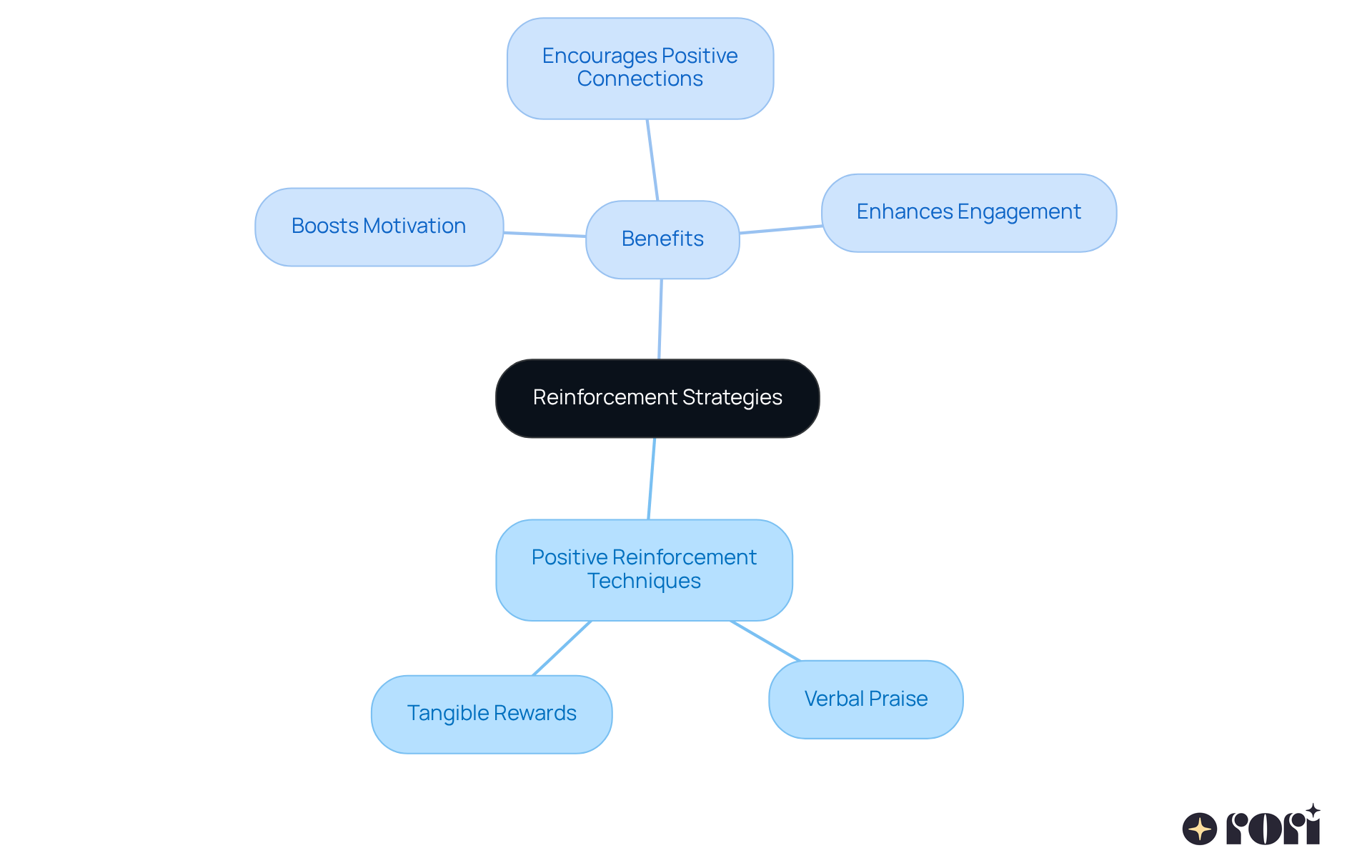
ABA discrete trial training is a fantastic method to help kids learn! By breaking down complex tasks into smaller, manageable steps, it ensures that each child gets a personalized treatment plan that fits their unique needs. Imagine your little one practicing a new skill repeatedly until they truly master it—this method not only helps them acquire new abilities but also reinforces what they’ve already learned, making it easier for them to apply those skills in different situations.
When caregivers actively participate, the results can be remarkable. In fact, significant progress is seen in about 90% of kids! This really highlights how crucial ABA discrete trial training is for enhancing learning, verbal, and social skills in children with autism. Let’s explore this together and see how we can support our children every step of the way!
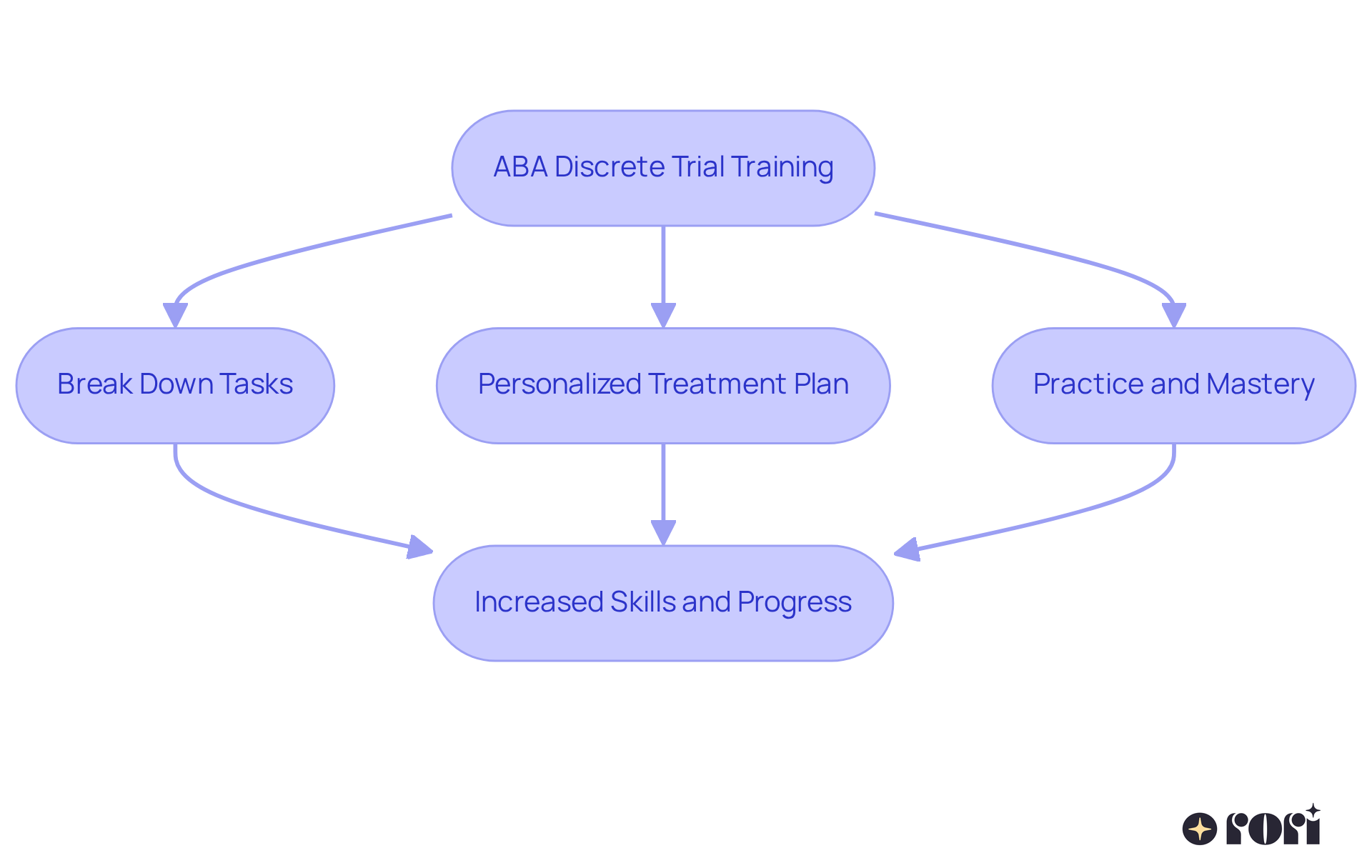
ABA discrete trial training is a fantastic way to help improve communication skills in kids with autism! By using structured prompts and reinforcement techniques, DTT makes it easier for children to pick up essential language skills, enabling them to express their needs and feelings more clearly. For example, through DTT, kids can learn how to ask for things or share their emotions, which really boosts their overall communication abilities and encourages social interactions.
Research shows that early intervention using ABA discrete trial training can lead to positive developmental outcomes, especially regarding language learning. Kids who engage in DTT sessions—typically 2 to 5 times a week—often see significant improvements in their language skills over time. This method not only helps with verbal communication but also supports understanding non-verbal cues, fostering a richer grasp of social dynamics.
Speech therapists highlight the importance of personalized approaches in DTT. They point out that strategies tailored to each child’s unique learning style can lead to impressive results. As Dr. O. Ivar Lovaas noted, these customized methods can really enhance language development in children with autism. Plus, the structured nature of ABA discrete trial training allows for regular practice and reinforcement, which are key to mastering new language skills.
Integrating ABA discrete trial training into therapy can lead to remarkable progress in a young person’s communication abilities, ultimately paving the way for better interactions and relationships. By focusing on specific language goals within the DTT framework, kids can build a solid foundation for effective communication—something that’s vital for their growth and independence. Let’s explore this together!
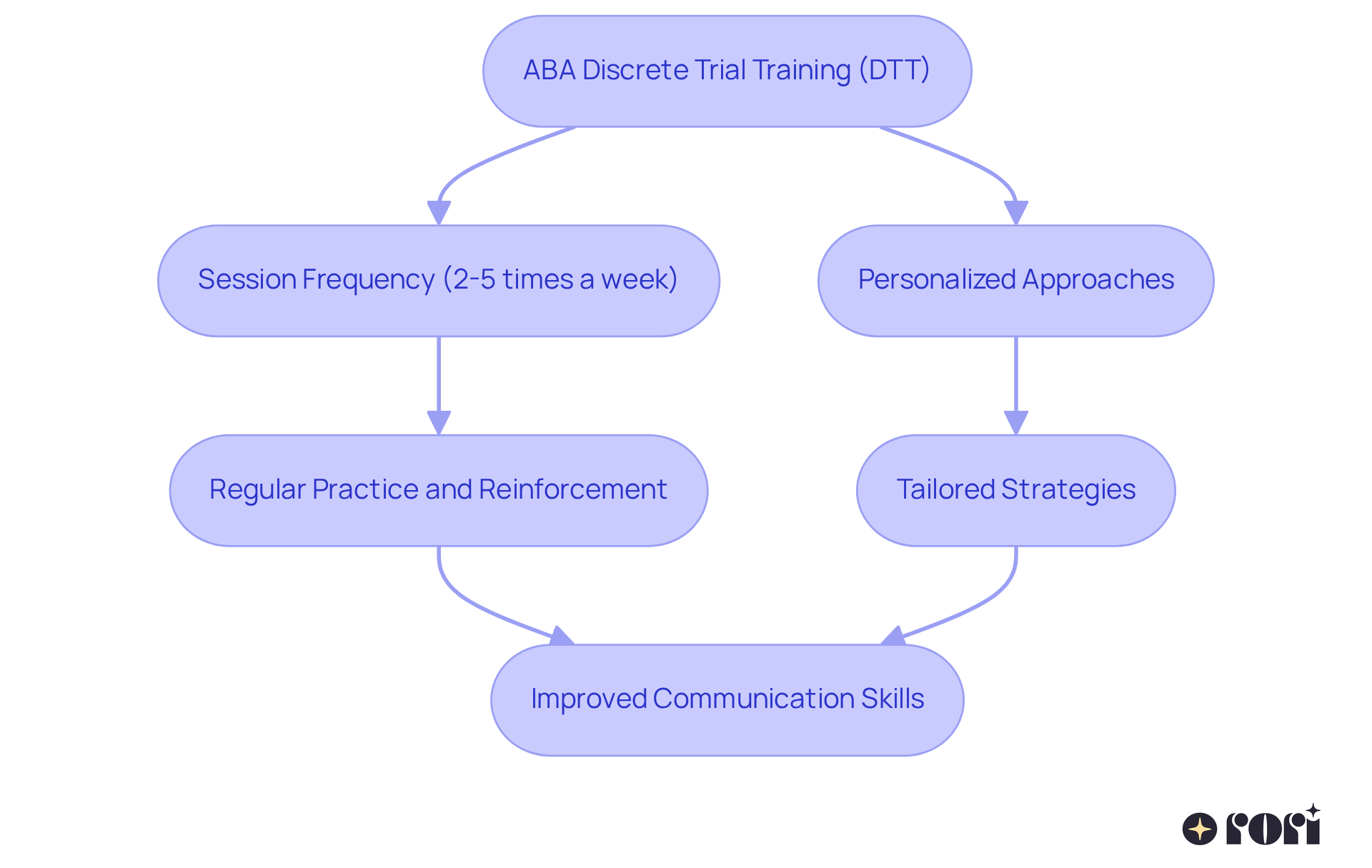
ABA discrete trial training is a wonderful way to help kids with autism develop essential interpersonal skills, like turn-taking, sharing, and starting conversations. At Rori Care, our dedicated clinical leadership team is passionate about promoting neurodiversity and empowering caregivers with effective strategies that include ABA discrete trial training principles. By practicing these skills in a structured environment, children gain confidence in their interactions with peers.
DTT, or ABA discrete trial training, can also teach important interpersonal behaviors, such as greetings and sharing. Incorporating role-playing and narrative scenarios into DTT sessions enriches their understanding and application in real-life situations. This approach not only promotes skill development but also nurtures meaningful interactions, enabling kids to navigate social situations more effectively.
Each ABA discrete trial training trial consists of four key elements:
Together, these create a reliable routine that benefits individuals who thrive on consistency. Research shows that kids who engage in ABA discrete trial training regularly often make significant strides in their communication and social interaction skills, highlighting the effectiveness of this method in teaching vital social behaviors.
Moreover, children who start ABA discrete trial training early tend to see better results over time, making early intervention an appealing choice for parents. Let’s explore this together! We’re here to help you every step of the way!
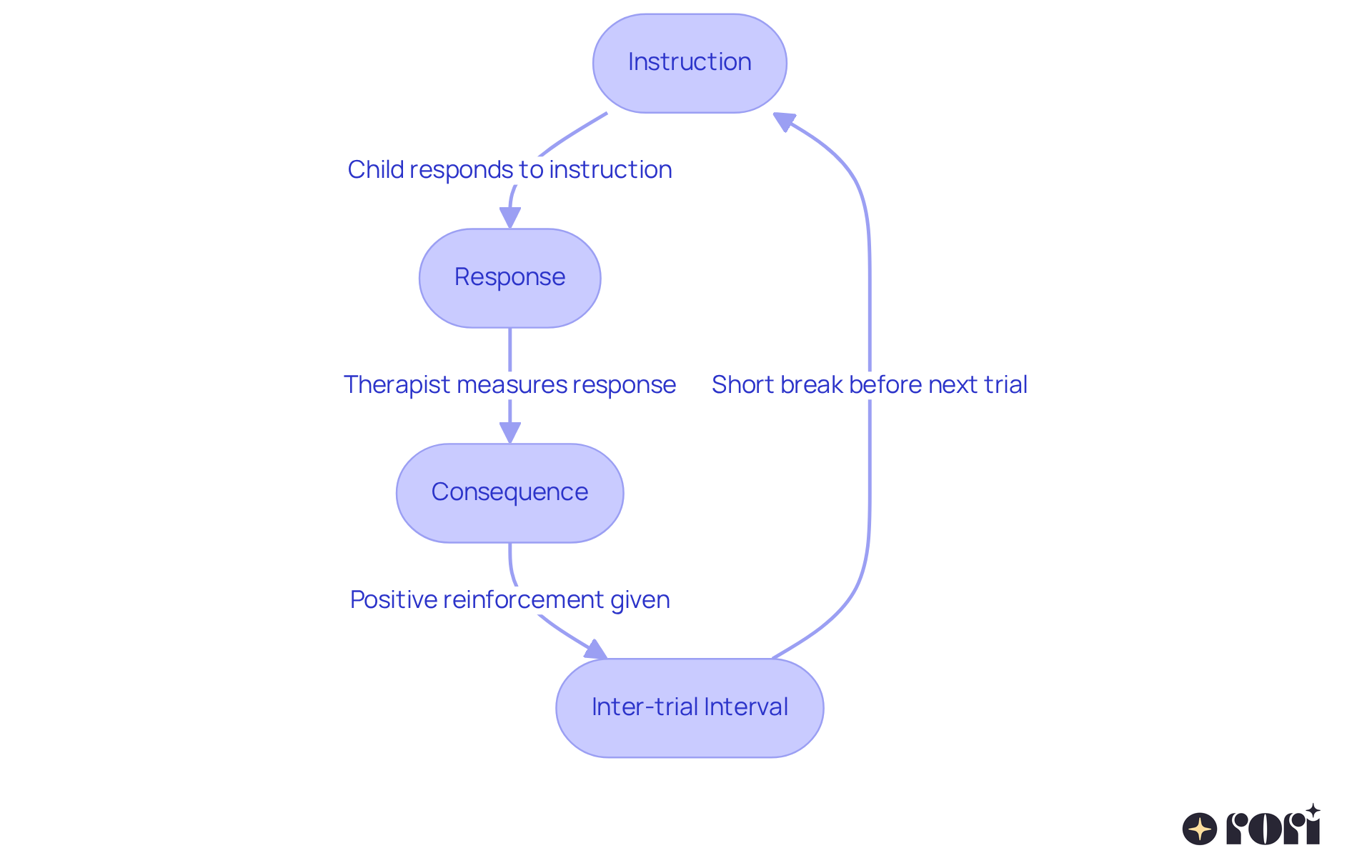
Generalization is all about applying what you've learned in therapy to everyday life, and it’s a key part of effective ABA discrete trial training! ABA discrete trial training really helps with this by mixing up different environments and situations during training sessions. For instance, imagine a young person who learns to communicate not just in therapy but also at home or in the community. This way, they can use their skills with different people and in various situations.
Research shows that individuals with Autism Spectrum Disorder (ASD) who can generalize their skills tend to feel more confident, flexible, and can hold onto those skills for the long haul. This adaptability is super important for building independence and helping them thrive in daily life. For example, if a young person learns to ask for help during therapy, they can use that same skill at school or in social settings, making it easier to connect with peers and adults alike.
Behavior analysts really stress the need to plan for generalization in ABA discrete trial training. One expert noted, "Generalization must be a priority in educational planning." This highlights how it influences how we think about competence and teaching methods. We’ve seen wonderful examples of kids who can identify social cues or manage daily tasks on their own, showcasing just how impactful generalization can be!
To really boost generalization, therapists often mix things up by changing the teaching environments, involving different instructors, and using natural teaching methods. Educating caregivers is also crucial, as it empowers them to reinforce these skills at home. This teamwork not only helps ensure that skills are learned but also that they stick and can be used in real-world situations. Ultimately, this leads to greater independence and a better quality of life for individuals with ASD.
Additionally, generalization can be broken down into three main types:
Each type plays a key role in making ABA discrete trial training effective. Let’s explore this together!
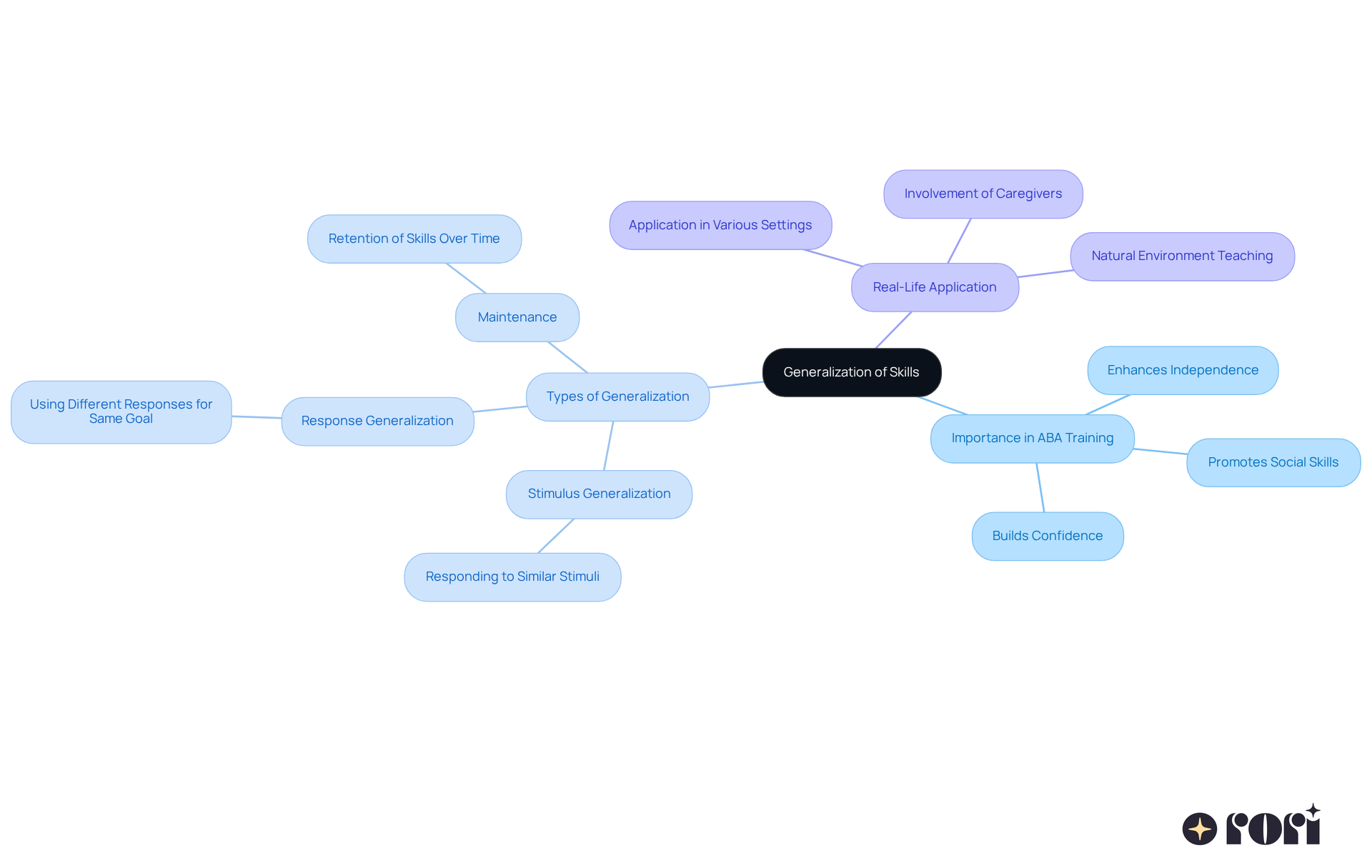
ABA discrete trial training can be implemented in a variety of settings, such as homes, schools, and community spaces. This flexibility allows therapists and parents to tailor the training to fit each child's unique needs and circumstances. When kids learn in familiar environments, they're often more excited to engage and use their skills, which helps them learn better in real-life situations.
Plus, when caregivers understand ABA discrete trial training principles and strategies, they’re better prepared to support their children at home. This not only complements professional help but also promotes consistency in their learning. When caregivers are involved and informed, it boosts the effectiveness of ABA discrete trial training, leading to better behavioral outcomes. Ultimately, this empowers caregivers and nurtures a more positive family dynamic. Let’s explore this together!
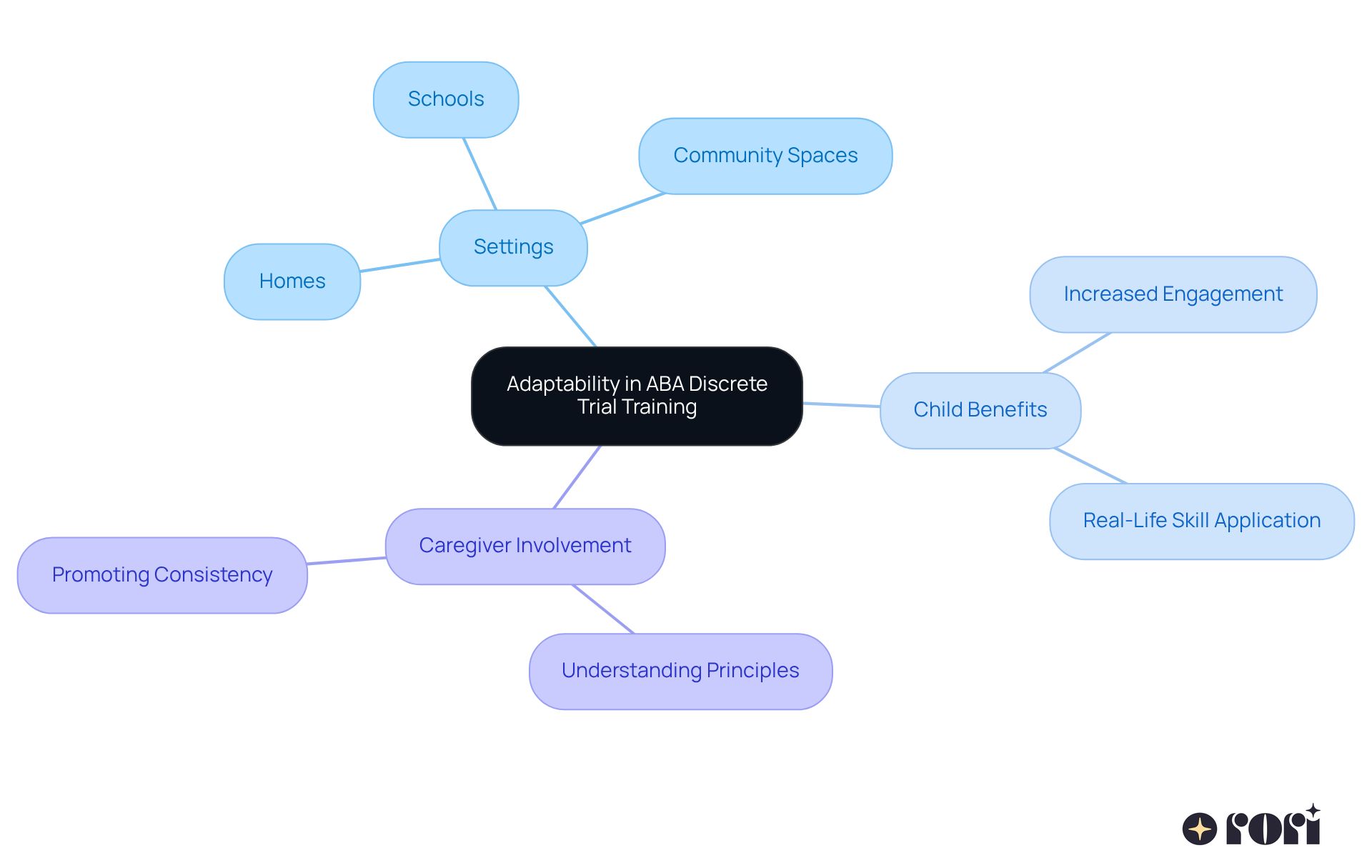
Comprehensive studies highlight how effective ABA discrete trial training can be in improving various skills in youth with autism, aligning beautifully with Rori Care's patient-focused approach. Meta-analyses reveal a large overall effect size of 0.81, showcasing significant improvements in communication, social skills, and daily living abilities for children who participate in DTT compared to those who don’t. For instance, research shows that video-based modeling (VBM), often paired with DTT, can lead to impressive skill acquisition, with effect sizes ranging from -0.26 to 0.96, illustrating how results can vary based on different implementation strategies.
What's particularly exciting is that DTT not only boosts communication skills but also enhances social interactions and daily living skills! One study pointed out that children receiving ABA discrete trial training (DTT) made greater strides in these areas, underscoring the essential role of ABA discrete trial training in Applied Behavior Analysis therapy. At Rori Care, we tailor our ABA discrete trial training sessions to meet each child’s unique needs, ensuring that the strategies are both effective and engaging. Plus, combining DTT with reinforcement strategies has shown to create even more remarkable outcomes, especially when video modeling is used alongside traditional methods.
These findings are truly significant, suggesting that ABA discrete trial training is not just effective but vital for the developmental progress of youth with autism. As researchers delve deeper into the nuances of ABA discrete trial training implementation, the evidence consistently supports its effectiveness in fostering meaningful skill development and enhancing the quality of life for young individuals and their families. If you’re a parent looking to engage with DTT, why not chat with your therapist about how to weave these techniques into your daily routines? It can really enhance your child’s learning experience! Let’s explore this together!

One of the most important advantages of ABA discrete trial training is how it encourages independence in children with autism. By using ABA discrete trial training to teach skills in a structured way, kids learn to carry out tasks on their own, which reduces their reliance on caregivers. 🌟 Plus, ABA discrete trial training helps decrease challenging behaviors by reinforcing positive actions, which leads to improved overall behavior and greater autonomy in their daily lives.
Empowering caregivers through education in ABA principles and strategies boosts their confidence and equips them to provide enhanced support. This knowledge helps them make informed decisions that positively impact their child's behavioral goals. This active involvement not only complements professional interventions but also fosters more effective and lasting behavioral improvements. Let’s explore this together!
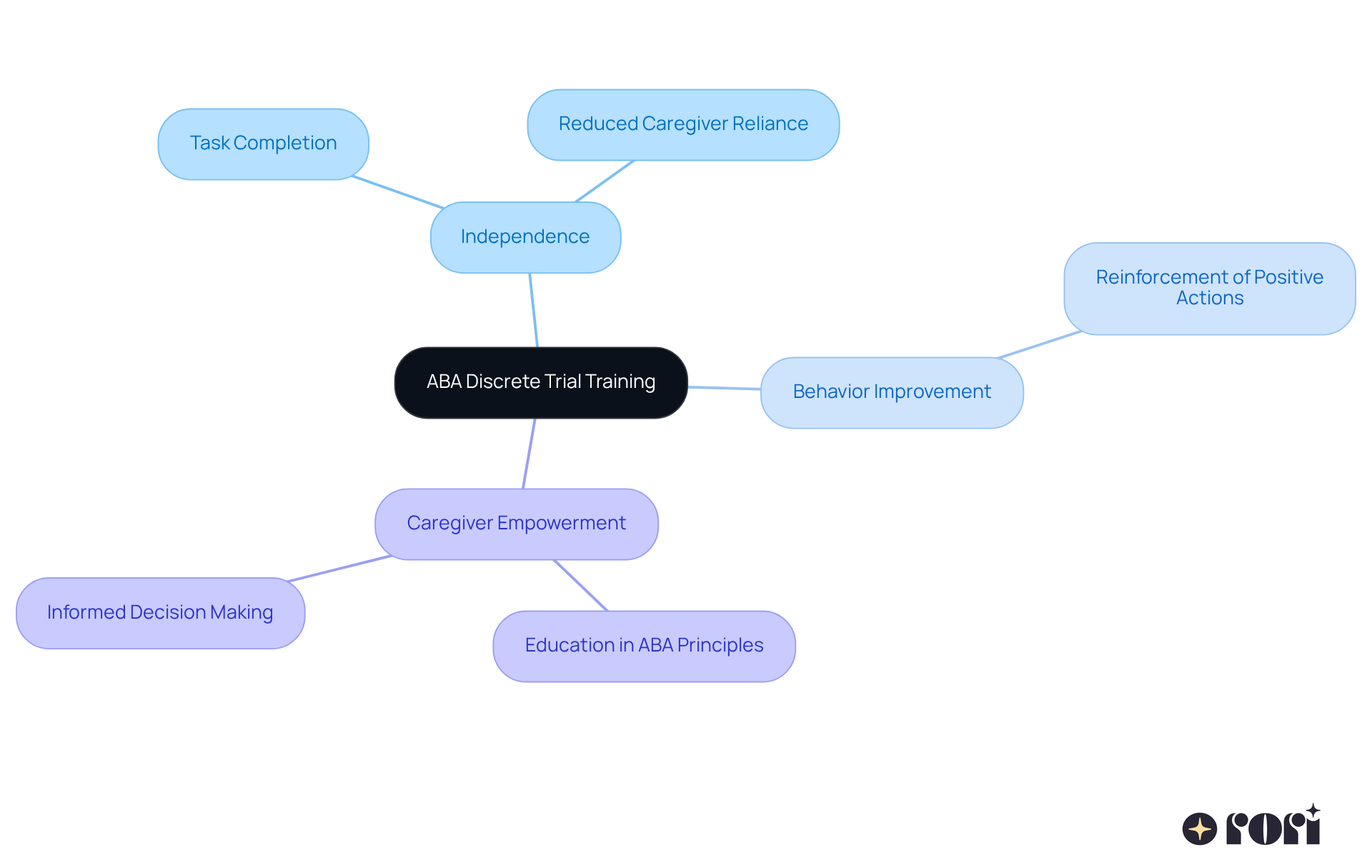
ABA discrete trial training truly shines as a wonderful method for nurturing growth and independence in children with autism. By breaking down complex tasks into manageable steps and using structured learning techniques, this approach not only makes learning easier but also boosts the overall effectiveness of ABA therapy. The personalized nature of DTT ensures that each child's unique needs are met, allowing for meaningful skill development that can lead to lasting improvements in their daily lives.
Throughout this article, we’ve touched on various benefits of ABA discrete trial training, including its role in skill acquisition, communication development, and social skills improvement. The systematic use of reinforcement strategies fosters engagement and motivation, while the adaptability of DTT allows it to be implemented in diverse settings, enriching the learning experience. Plus, research evidence backs up the effectiveness of DTT, showcasing its transformative impact on behavior and independence for children with autism.
Ultimately, embracing ABA discrete trial training can significantly enhance the quality of life for children and their families. By prioritizing early intervention and actively involving caregivers in the process, the potential for positive outcomes is greatly amplified. If you’re looking to boost your child’s development, exploring the benefits of DTT and connecting with trained professionals can pave the way for a brighter, more independent future. Let’s explore this together!
What is Rori Care's approach to ABA therapy?
Rori Care delivers personalized ABA discrete trial training therapy, which breaks down complex tasks into manageable steps to help individuals with autism learn effectively.
How does Rori Care tailor therapy to individual needs?
Rori Care integrates cutting-edge AI technology to personalize therapy for each individual, providing 50% more treatment time.
What is the goal of Rori Care's therapy?
The goal is to foster growth and progress, helping young individuals build independence through essential skill development.
How does Rori Care involve families in the therapy process?
Rori Care emphasizes active caregiver involvement by providing families with guidance and support throughout the therapy journey.
Is there an opportunity for families to learn more about Rori Care's services?
Yes, Rori Care offers a free consultation to help families kickstart their path with the therapy.
What is Discrete Trial Training (DTT)?
DTT is an approach that breaks down skills into small, manageable steps, allowing focused teaching on one ability at a time to ease feelings of overwhelm.
How does DTT structure its teaching process?
Each trial in DTT follows a structured format with a clear instruction, a response from the learner, and a consequence that reinforces the desired behavior.
Why is the number of trials important in DTT?
The number of trials can significantly impact the effectiveness of learning, as effective programs often include many trials to reinforce skills.
How does DTT benefit classroom dynamics?
The organized nature of DTT enhances classroom dynamics and boosts social confidence by providing a predictable and supportive learning environment.
What role do reinforcement strategies play in DTT?
Reinforcement strategies, such as positive reinforcement, help make learning activities more engaging and enjoyable, boosting motivation and encouraging positive connections with learning.
What is the impact of positive reinforcement in ABA therapy?
Young learners who receive consistent positive reinforcement during DTT sessions tend to be more engaged, leading to better learning outcomes.